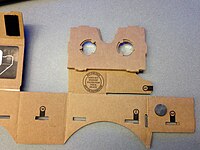Google Cardboard
 | |
 第二代Google Cardboard | |
| 研發商 | |
|---|---|
| 製造商 | Google、第三方公司 |
| 类型 | DIY虛擬實境穿戴式裝置 |
| 发布日期 | 2014年6月25日 |
| 出貨台數 | 1000万个 |
| 作業系統 | Android、IOS |
| 後繼機種 | Daydream |
| 網站 | 官方网站 |
Google Cardboard是Google所开发、与智能手机配合使用的虚拟现实头戴式显示器。该平台以其折叠式纸板头盔命名,旨在以廉价成本,激发对VR应用的兴趣和发展[1][2]。按照Google发布的规范,用户既可以利用廉价简易的元件自行制作头盔,或购买预先做好的头盔。要使用平台,用户须在手机上运行Cardboard兼容的应用,将手机置于头盔后端,透过镜片观看内容[3]。
该平台由巴黎Google艺术文化学院工程师大卫·科玆(David Coz)和达米恩·亨利(Damien Henry)利用他们20%“创意休息时间”(Innovation Time Off)开发[4],于2014年Google I/O开发者大会上亮相,被派发给现场所有观众。Cardboard的软件开发工具包(SDK)向Android和iOS操作系统开发。SDK的VR View允许开发者嵌入网络及他们移动应用中的VR内容。
到2017年3月,Cardboard发货量超过1000万个,1.6亿个Cardboard应用程序上线。乘着Cardboard平台的成功,Google在2016年的Google I/O上宣布了增强VR平台Daydream。
2019年,Cardboard開源。2021年3月,Google停售Cardboard[5]。
组装和操作
[编辑]Google Cardboard头盔利用简单低廉的组件制作。头盔规格由Google设计,零件清单、原理图和组装说明书在其网站上免费提供,让人们从现成的零件中组装Cardboard。预先做好的头盔只能从第三方供应商取得,直到2016年2月,Google开始透过Google Store销售自家出产的头盔[6]。
组装Cardboard头盔的零件有一块切割成精确形状的纸板、45mm焦距透镜、磁铁或电容式感应胶带、尼龙搭扣(如维克罗)、橡皮圈和可选的近场通信标签。Google为大规模制造提供额外的建议,基于这些计划的预组装套件源于多个供应商,成本不到5美元[7],这些供应商也制作各种Cardboard。
组件装好后,将智能手机插入设备背部,用所选的紧固装备固定。兼容Google Cardboard的应用程序将智能手机显示的画面分成两个,每个眼睛一个,同时对每个画面进行桶形失真,抵消镜头的枕形失真[8],形成视野广阔的立体(3D)图像。
Cardboard首个版本贴合5.7英寸屏的手机,利用磁铁作为输入按钮,需要用到手机的罗盘传感器。更新版设计于2015年Google I/O发布,磁贴开关换成导电杆,在手机屏幕上触发触摸事件,更好地兼容各种设备。
软件
[编辑]Google提供三套开发Cardboard应用的软件开发工具包,一套用Java供Android操作系统使用,一套用C♯供Unity游戏引擎使用,一套供iOS操作系统使用[9]。最初仅支持Android,后来Google在2015年5月的Google I/O会议上宣布iOS支持Unity插件[10]。Cardboard支持的第三方应用在Google Play商店[11]和iOS的上App Store上线。除了原生的Cardboard应用,Google Chrome的VR实验利用WebGL实现,包括iPhone在内的支持WebGL的手机也可以运行Google的网页实验[12][13]。在2015年Google I/O上,iOS的Google Cardboard演示应用程序接口发布[14]。2016年1月,Google宣布,软件开发工具包将支持空间音频,这种虚拟现实效果能模拟3D空间中出自听众头部外面任何地方的音频[15][16]。
2016年3月,Google发布Cardboard SDK扩展应用VR View,允许开发者嵌入网页或移动应用程序中的360度VR内容,适用于桌面、Android和iOS[17]。VR内容发布网页的Javascript和HTML代码开源,在GitHub上公布,开发者可自行托管内容[18]。
衍生品
[编辑]Jump
[编辑]Jump是Google开发的虚拟现实影片制作生态系统,于2015年5月28日在Google I/O大会上公布。如同Google对待Cardboard头盔一样,Google对Jump也开发了由16台摄像机圆状阵列构成的样式,并和公众发布[19]。GoPro和Google合作,利用自家摄像机搭建阵列[20],但Jump系列理论上支持任何摄像机[19]。一旦拍好画面,VR视频将由Jump的后端软件“汇编器”编译。汇编器使用计算机摄影和“计算机视觉”重建场景,产生数千个中间视点[19]。通过Jump拍摄的成片可配合Cardboard头盔透过YouTube的立体VR模式观看[19]。
Expeditions
[编辑]Expeditions计划提供透过Google Cardboard头盔的VR课堂体验,让教育人士带着他们的学生进行虚拟的实地考察[21]。该计划也在2015年Google I/O上公布,计划于2015年秋季运行[22]。每个教学套件包内含30个同步的Cardboard头盔和智能手机,以及一个供充当向导的老师使用的平板电脑[23]。有意将计划带到学校的教师可在线注册[24]。CNET称Cardboard是“首个面向儿童的虚拟现实平台”[25]。到2016年5月,超过100万学生透过该计划进行VR实地考察[26]。
合作与推广
[编辑]2014年11月,沃尔沃发布了Volvo牌Cardboard眼睛和Android应用“Volvo Reality”,让用户探索XC90[27]。2015年2月,玩具制造商美泰尔联合Google宣布立体头盔View-Master的VR版。头盔Android版于2015年秋季发布,iOS和Windows智能手机随后发布[28]。
Google也和LG电子合作,为LG G3定制Cardboard头盔“VR for G3”。该免费配件于2015年2月发布,在某些国家或地区连同新的G3机型派发,被视为三星Gear VR配件的有力竞争者[29]。
2015年11月8日,《纽约时报》面向所有家庭订阅户派发Google Cardboard。读者用智能手机下载“NYT VR”应用程序,可享受沉浸式VR环境的新闻阅读体验[30]。
2015年12月,为配合《星球大战:原力觉醒》的宣传,Google在Google Store和Verizon免费推出三款《星球大战》主题的Cardboard头盔[31]。
2016年科切拉音乐节的持票者会在欢迎礼包中获得Google Cardboard创意的VR纸板头盔,该头盔配合“Coachella VR”移动应用使用。组委会联合Vantage.tv提供音乐节的VR内容,如往届活动的360度全景照、2016年活动地点的虚拟游览、采访和表演[32]。
评价
[编辑]2016年1月27日,Google宣布平台第19个月,Cardboard发货量超过500萬个,上架的兼容应用超过1000个,安装次数达2500多万次。公司介绍,期间用户观看了超过35万小时的YouTube VR视频,50万名学生通过Expeditions计划进行VR实地考察[33][34]。到2017年3月,发货量突破1000万,应用程序下载量超过1.6亿次[35]。
Cardboard的成功说服Google开发更先进的虚拟现实硬件并任命新的虚拟现实主管[36]。2016年5月18日,Google在I/O大会上公布了名为Daydream的增强型VR平台[37]。
參見
[编辑]- Google眼鏡,另一個Google公司的產品,將可以在眼前顯示資料
- Oculus Rift,虛擬實境(VR)計劃,近期被Facebook收購
- 三星Gear VR,三星電子與Oculus VR合作的產品
- PlayStation VR,索尼的虛擬實境計劃
- Virtual Boy,任天堂的1995年桌上型3D遊戲機
- HTC Vive,宏達國際電子(HTC)和維爾福公司(Valve Corporation)合作的虛擬實境產品
參考資料
[编辑]- ^ Pierce, David. Google Cardboard is VR's Gateway Drug. Wired. 2015-05-28 [2015-06-17]. (原始内容存档于2020-11-08).
- ^ Branstetter, Ben. Cardboard is everything Google Glass never was. kernelmag.dailydot.com. 2015-06-28 [2015-06-28]. (原始内容存档于2015-06-28).
- ^ Pierce, David. Inside Google’s Plan to Make VR Amazing for Absolutely, Positively Everyone. Wired Magazine. 2016-04-14 [2016-04-14]. (原始内容存档于2017-06-24) (美国英语).
- ^ Statt, Nick. Facebook has Oculus, Google has Cardboard. CNET. 2014-06-25 [2014-08-19]. (原始内容存档于2020-11-30).
- ^ Google Cardboard VR 正式停售. [2021-03-04]. (原始内容存档于2021-03-10).
- ^ Fingas, Jon. Google starts selling Cardboard VR viewers through its store. Engadget. AOL. 2016-02-29 [2016-04-03]. (原始内容存档于2016-03-01).
- ^ Dougherty, Conor. Google Intensifies Focus on its Cardboard Virtual Reality Device. New York Times. 2015-05-28 [2015-06-17]. (原始内容存档于2020-11-08).
- ^ Unity Reference: Google Cardboard. developers.google.com. [2015-06-03]. (原始内容存档于2015-06-17).
...specifies whether you want the values as seen through the Cardboard lenses (Distorted) or as if no lenses were present (Undistorted). ... When VR Mode is enabled, stereo cameras render side-by-side to this target automatically. Each frame, the result is corrected for distortion and then displayed. ... Implements the same barrel distortion that is performed by the native code.
- ^ Google Cardboard – Google. Google. [2015-06-02]. (原始内容存档于2021-01-27).
- ^ Tarantola, Andrew. Google Cardboard now works on iOS. Engadget. 2015-05-28 [2015-06-02]. (原始内容存档于2019-04-09).
- ^ Broida, Rick. Five more apps that work with Google Cardboard: Games, flight sims, movie players, and more, all great fits for your Google VR headset.. CNET. 2014-07-17 [2014-08-19]. (原始内容存档于2019-02-17).
- ^ Virtual Reality. Chrome Experiments. [2014-08-19]. (原始内容存档于2014-10-04).
- ^ Johnson, Dave. Google Cardboard works on the iPhone, too. CBS News. 2014-08-18 [2014-08-19]. (原始内容存档于2020-12-02).
- ^ Lee, Nicole. Google Cardboard VR for iPhone hands-on. Engadget. 2015-05-28 [2015-06-02]. (原始内容存档于2019-02-04).
- ^ Eadicicco, Lisa. Google's Cheap Virtual Reality Headset Is About to Get Better. Time.com. Time Inc. 2016-01-14 [2016-01-17]. (原始内容存档于2016-01-16).
- ^ Martz, Nathan. Spatial audio comes to the Cardboard SDK. Google Developers Blog. 2016-01-13 [2016-01-17]. (原始内容存档于2016-02-27).
- ^ Vincent, James. Google's new VR View tool allows easy embedding of 360-degree content. The Verge. Vox Media. 2016-03-31 [2016-04-03]. (原始内容存档于2020-11-08).
- ^ Martz, Nathan. Introducing VR view: embed immersive content into your apps and websites. Google Developers Blog. 2016-03-30 [2016-04-03]. (原始内容存档于2020-11-25).
- ^ 19.0 19.1 19.2 19.3 O'Kane, Sean. Google Jump is an entire ecosystem for virtual reality film-making. The Verge. Vox Media. 2015-05-28 [2015-06-09]. (原始内容存档于2020-11-08).
- ^ Duino, Justin. We took a look at the GoPro Google Jump camera array. Android Central. Mobile Nations. 2015-05-29 [2015-06-09]. (原始内容存档于2020-08-07).
- ^ Etherington, Darrell. Google Launches ‘Expeditions,’ An App For Shared Virtual School Field Trips. TechCrunch. AOL. 2015-05-28 [2015-06-12]. (原始内容存档于2021-01-24).
- ^ Novet, Jordan. Google announces Cardboard Expeditions to let teachers take classes on field trips. VentureBeat. 2015-05-28 [2015-06-12]. (原始内容存档于2020-11-08).
- ^ Lee, Nicole. Google makes its case for VR by reinventing the field trip. Engadget. AOL. 2015-06-04 [2015-06-12]. (原始内容存档于2019-03-27).
- ^ Robertson, Adi. Google has a new Cardboard headset, and it supports iPhones. The Verge. Vox Media. 2015-05-28 [2015-06-12]. (原始内容存档于2020-11-08).
- ^ Stein, Scott. Cardboard for kids: Google's bet on the future of VR is children. CNET. 2015-06-02 [2015-06-28]. (原始内容存档于2020-11-08).
- ^ Novet, Jordan. Google is working with IMAX and Yi Technology to build Jump-ready VR camera rigs. VentureBeat. 2016-05-19 [2016-07-18]. (原始内容存档于2020-11-08).
- ^ Ziegler, Chris. Volvo is using Google Cardboard to get people inside its new SUV. The Verge. Vox Media. 2014-11-13 [2015-06-02]. (原始内容存档于2020-11-12).
- ^ Baig, Edward C. View-Master rides Google Cardboard into virtual reality. USA Today. 2015-02-13 [2015-05-30]. (原始内容存档于2020-09-06).
- ^ For LG's G3, virtual reality is just a bundle away. CNET. [2015-09-25]. (原始内容存档于2020-11-29).
- ^ NYT VR: How to Experience a New Form of Storytelling From The Times. New York Times. 2015-11-05 [2015-11-07]. (原始内容存档于2017-07-29).
- ^ Olanoff, Drew. Get a Free Star Wars Edition Google Cardboard. TechCrunch. 2015-12-11 [2015-12-12]. (原始内容存档于2020-11-24).
- ^ Brennan, Collin. Coachella 2016 will be broadcast in virtual reality. Consequence of Sound. 2016-03-10 [2016-03-11]. (原始内容存档于2016-03-11).
- ^ Dipane, Jared. Google: 5 million Cardboard viewers shipped, 25 million VR apps downloaded. Android Central. Mobile Nations. 2016-01-27 [2016-01-27]. (原始内容存档于2016-07-12).
- ^ Singleton, Micah. Google has shipped over 5 million Cardboard headsets. The Verge. Vox Media. 2016-01-27 [2016-01-27]. (原始内容存档于2021-01-27).
- ^ Jonnalagadda, Harish. Google has shipped 10 million Cardboard VR headsets since 2014. Android Central. Mobile Nations. 2017-03-01 [2017-03-01]. (原始内容存档于2020-08-07).
- ^ Nicas, Jack. Alphabet Appoints New Virtual-Reality Chief. Wall Street Journal. 2016-01-12 [2016-02-12]. (原始内容存档于2020-08-01).
- ^ Robertson, Adi; Miller, Ross. Daydream is Google’s Android-powered VR platform. The Verge. Vox Media. 2016-05-18 [2016-05-18]. (原始内容存档于2020-12-22).




